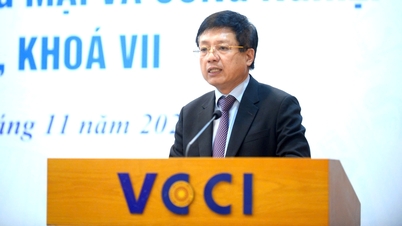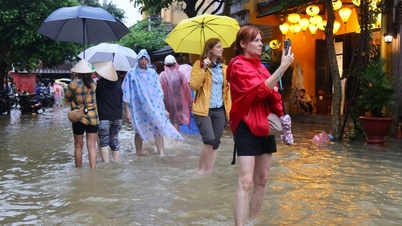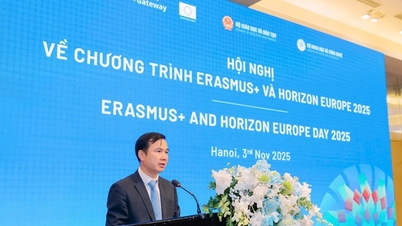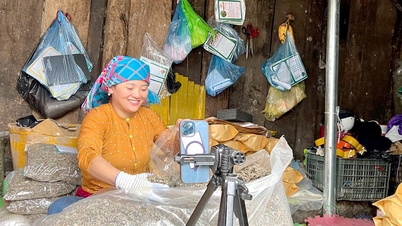On the morning of November 3, authorized by the Prime Minister, Minister of Industry and Trade Nguyen Hong Dien presented the draft Law on E-commerce.
According to the report, Vietnam's e-commerce is highly appreciated by prestigious market research organizations, ranking 3rd in Southeast Asia in terms of scale in 2024 and 5th in the world in terms of growth rate in 2022.
The scale of the e-commerce retail market will grow rapidly from 2.97 billion USD in 2014 to 25 billion USD in 2024, with an average growth of 20-30% over the period, contributing 10% of total revenue from consumer goods and services nationwide in 2024.
In addition, the e-commerce market is an attractive investment destination for many foreign investors, helping Vietnamese consumers become global consumers, with access to diverse and abundant products both domestically and internationally.
Vietnamese small and medium enterprises have taken advantage of modern platforms to develop distribution channels for goods and products.

Minister of Industry and Trade Nguyen Hong Dien presents a report (Photo: Nhu Y).
The drafting agency affirmed that it is very necessary to build the Law on E-Commerce to be consistent with the 2013 Constitution and the 2015 Civil Code.
Article 20 of the draft law stipulates the responsibilities of e-commerce platform owners in livestream sales activities.
Accordingly, the draft law stipulates measures to prevent, stop real-time streaming, remove displayed information and links when detecting livestream sales content in some cases.
One is livestream sales content that violates the law or contains language, images, costumes, or behaviors that go against social ethics and customs.
Second, livestream sales content for prohibited goods and goods temporarily suspended from circulation on the market at the request of State management agencies; goods and services prohibited from advertising according to the provisions of law on advertising.
Article 20 of the draft law also stipulates a mechanism for displaying warning content when livestreaming sales of goods and services that are likely to cause insecurity and adversely affect the life, health, and property of buyers.
Along with that, storing and ensuring the ability to access electronic data information containing images and sounds of livestream sales activities for at least 1 year from the time of starting the broadcast, according to the draft law.
The draft law also stipulates that sellers in livestream sales activities must provide documents proving that they meet investment and business conditions for conditional investment and business sectors and professions before livestreaming sales; documents and papers proving that they meet product and goods quality requirements according to the law on product and goods quality.
In addition, livestream sales content must be consistent with confirmed advertising content.
Regarding the responsibilities of livestream sellers, the draft law stipulates that livestream sellers must not provide false or misleading information about the uses, origin, quality, prices, promotions, warranty policies and other content related to goods and services.
Along with that, livestream sellers must use language, images, costumes, and behaviors that are not contrary to social ethics and customs during the livestream sales process...
Examining the content of livestream sales and affiliate marketing activities (Articles 20 to 24 of the draft law), the National Assembly's Economic and Financial Committee proposed clearer regulations on the aspects of these activities that are specifically regulated by the Law on E-commerce.
At the same time, distinguish between general contents regulated by the Law on Network Information Security, Law on Cyber Security, Law on Advertising, Law on Consumer Rights Protection, at the request of the examining agency.
See the full text of the draft Law on E-Commerce here.
Source: https://dantri.com.vn/kinh-doanh/buoc-dung-livestream-ban-hang-trong-truong-hop-nao-20251103092131953.htm



![[Photo] Fall Fair 2025 and impressive records](https://vphoto.vietnam.vn/thumb/1200x675/vietnam/resource/IMAGE/2025/11/03/1762180761230_ndo_br_tk-hcmt-15-jpg.webp)
![[Photo] Prime Minister Pham Minh Chinh receives the Chairman of the Japan-Vietnam Friendship Association in the Kansai region](https://vphoto.vietnam.vn/thumb/1200x675/vietnam/resource/IMAGE/2025/11/03/1762176259003_ndo_br_dsc-9224-jpg.webp)
![[Photo] General Secretary To Lam receives Singaporean Ambassador Jaya Ratnam](https://vphoto.vietnam.vn/thumb/1200x675/vietnam/resource/IMAGE/2025/11/03/1762171461424_a1-bnd-5309-9100-jpg.webp)
![[Photo] Lam Dong: Close-up of illegal lake with broken wall](https://vphoto.vietnam.vn/thumb/1200x675/vietnam/resource/IMAGE/2025/11/03/1762166057849_a5018a8dcbd5478b1ec4-jpg.webp)








































































































Comment (0)